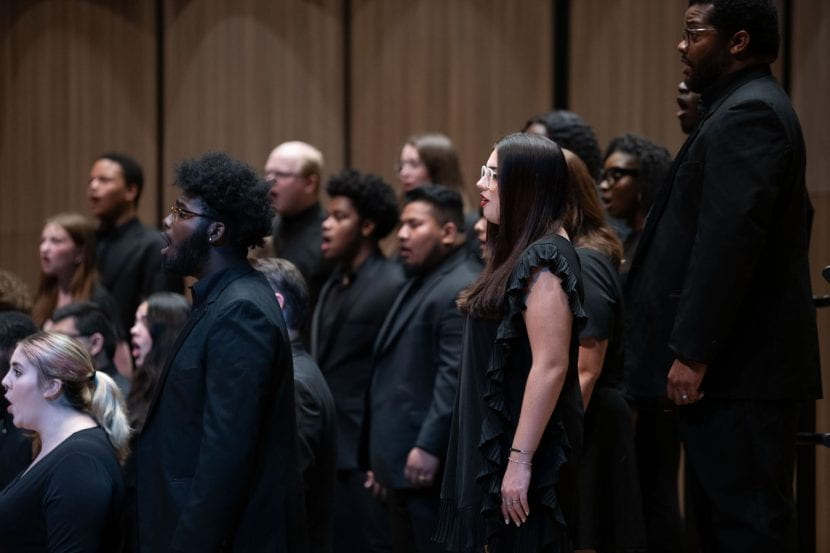By Caroline Phillips Burk
During college auditions, professors are looking for students who are good players with the potential to grow as professionals. If a professor notices potential, a desire to achieve and a willingness to put in effort, they are likely to overlook shortcomings or blunders during the audition process. While you should try to perform your best, remember that nobody is perfect. At the University of Memphis, we try to make the audition process as smooth and fun as possible for prospective students. Here is a list of a few ways to ease your pre-audition nerves!
1. Contact Potential Professors
Once you’ve researched the schools you want to apply to, pluck up your courage and contact studio faculty. Don’t be afraid to approach teachers; students in high school do it frequently. Make a lot of inquiries on the curriculum, the students enrolled, and the graduates’ professional trajectories. Tell them your objectives and inquire how their program may support you in achieving them. Before the audition day, the professor will typically be pleased to give you a trial lesson. You’ll learn a lot about them as your mentor for the following four years from your encounters with them.
2. Performance Anxiety
It’s common to experience anxiety or audition jitters before college audition season. The more factors you can control—repertoire preparation, practice runs, hydration and sleep—the more confidently you will perform. Recognize that everyone is experiencing the same emotions as you. Understanding this can help to alleviate some of the tension. Professionals use various methods, including centering, deep breathing, visualization and meditation.
3. Get Organized
You will be required to prepare substantial material for both live and prescreening auditions. This material occasionally crosses over from prescreening to live auditions, and occasionally it doesn’t. Furthermore, some institutions will have distinct audition material, while many will have similar or identical lists.
Putting all this information in one location (like a digital folder or a three-ring binder) is the smartest thing you can do. Create a master list of all the content after that to see which sections are distinct and which overlap. Simply getting organized can offer you a significant advantage!
4. Rehearsal Strategies
To ensure that you are comfortable with any order, it is advised that you rehearse your repertoire in a number of ways. A panel may skim over some of the music on your list to save time; for example, they may not hear your scales or an etude. Recognize that this is a possibility. The panel could also ask, “What solo would you like to start with?” Choose the solo in which you are most confident. Never decide based on what you believe they would like to hear.
5. Self Care
Because the audition process might be stressful, please don’t forget to give yourself time to relax. These are excellent ways to reduce stress and maintain good health: take a nap, read, write in a journal, chat with friends, laugh, meditate, watch a funny movie and stay hydrated.
6. For Parents
What will you do as a parent once your child’s audition ends? Do you ask them about the outcome? Do you inquire about their admission to the school? Recognize that they might decide not to tell you anything. Ultimately, the student and their private teacher can benefit from the information from the audition. When the audition is over, the best question you can ask is, “What do you want to eat?” Your role should always be encouraging.
More Information
Audition day activities typically start in the morning and run until mid-afternoon. Students will be assigned a specific audition time about one week before their audition day. Events will be scheduled throughout the day that will allow you to get to know the School of Music and your future classmates. During that time, you may experience the following activities:
- General welcome assembly and performance
- Program and applied area meetings
- Auditions and interviews
- Parent and family Q&A sessions
- Scheidt Family Performing Arts Center tours
The School of Music Scheidt Music Extension Program also offers a Music Theory College Prep Course. Music theory is usually the most challenging academic course that music majors take. This course will help prepare high schoolers for music theory, dictation, ear training, and piano. Register here!
Schedule Your Audition
Prospective students can select their preferred day and method of audition on the School of Music application.
Upcoming Audition Dates
- February 17, 2024
- February 24, 2024
If you have additional questions, contact our Admission Office at musicadmissions@memphis.edu.
ABOUT THE AUTHOR
Caroline Phillips Burk is a senior majoring in Music Education. She has performed with several School of Music ensembles, including University Singers. She is preparing for graduation this semester while student-teaching with Memphis Shelby County School District.
